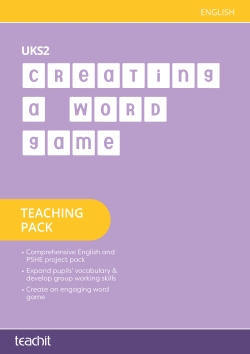Creating a word game teaching pack
What’s included:
Vocabulary acquisition, consolidation and expansion are top of the Covid-19 recovery agenda and an essential part of the Primary English curriculum.
With this in mind, our Creating a word game teaching pack contains all the elements you need to help pupils develop a broader, richer and deeper vocabulary (while playing fun word games!).
With a focus on key aspects of vocabulary building at upper key stage 2, this project-based learning pack will set pupils up for a successful transition to secondary school.
At a glance ...
Pupils start off by considering different learning styles and preferences, then move on to using thesauruses and dictionaries to help them research and learn new words in order to create a word bank. They finish by planning and developing their own vocabulary board games (in groups).
Structure
This 56-page teaching pack includes lesson plans and templates to develop a broad range of skills – from research skills to important project and PSHE skills (such as group work, collaboration and effective speaking and listening).
Divided into five milestones or sections, pupils will learn the rules of a new vocabulary game and then use a range of materials and resources to develop their own word game which they then try out with their class.
The printable teaching pack includes everything you need for a complete, project-based unit, and has three sections: a lesson plans section with detailed teaching notes; a teacher pack with lesson resources and answers; and a pupil pack for use in class.
Collaboration, group work & social skills
PSHE elements are integrated into the pack to develop key social skills alongside core English curriculum elements.
What's inside?
Milestone 1: Thinking styles and learning preferences
Investigating learning styles
Playing a collaborative game
Milestone 2: Learning the rules for ‘Words with friends’
Investigating ‘Words with friends’ game
Generating a word bank
Milestone 3: Researching vocabulary words
Exploring dictionaries and thesauruses
Researching a word bank
Milestone 4: Making games
Workng collaboratively to create a word game
Reflect on learning styles
Milestone 5: Playing the games
Playing word games against other groups
Reflect upon the success of the word game and consider improvements
How to use our printable word game teaching pack:
Use our Creating a word game teaching pack as a stand-alone project to support vocabulary development across key stage 2 or use it to supplement or refresh existing schemes of learning or units of work.
Many of the worksheets and teaching resources can also be used as meaningful homework activities and will save you planning time. The integrated assessment elements also mean that you can use the project as a way of benchmarking pupil attainment levels.
Versatile enough to be used as a whole class project, in a home school setting, or with EAL/ESL learners, the Word document format provides editable content that can be adapted for every setting or individual.
Containing a quick synonym quiz, fun games and word-building activities, you can develop pupils’ awareness of words in a fun way with this interactive unit.
If you are looking for more teaching packs, browse Teachit Primary’s entire teaching pack collection, or see all our Primary English packs.
Our thanks go to colleagues at TeacherVision.com for allowing us to re-use their original content.
An example from the teaching pack:
To find synonyms and antonyms of a word:
- Thesauruses are organized alphabetically, so start with the first letter of the word that you are trying to find. Go to that letter in the thesaurus.
- Use the second, third and fourth letters to find the page where the word will be. Scan the page until you find your word.
- Look for synonyms and antonyms of the word that are more interesting and less commonly-used.
If you are using the thesaurus to find interesting words for your word bank, use these tips:
- Think of a commonly used word that is too easy to add to your word bank.
- Look it up in the thesaurus and find synonyms and antonyms for the word that are more interesting words.
Try to find words that include a lot of different letters.

